
16 minute read
Astronomy as a Tool in Community Building, Experience in East Java, Indonesia
Astronomy as a Tool in Community Building, Promoting Social Unity, and Solidarity: First-hand Experience in East Java, Indonesia
Muchammad Toyib
Advertisement
Surabaya Astronomy Club, East Java Amateur Astronomer Communication Forum (FOKALIS JATIM) muchammadthoyib@gmail.com
Aditya Abdilah Yusuf
ITERA Astronomical Observatory, East Java Amateur Astronomer Communication Forum (FOKALIS JATIM) aditya.abdilah.yusuf@gmail.com
Keywords
outreach, public engagements, community building, social unity, IAU100
Community building and social unity have become important for almost every developing country, including Indonesia. These issues are reflected in the economic limitations, and, in turn, the limited access to education and outreach initiatives. The East Java Amateur Astronomer Communication Forum uses a ‘safari of the telescope’ to visit several cities in the province of East Java. In these expeditions, we invite people to observe celestial objects together in groups and gradually provide scientific information to bring them closer to science, especially astronomy, using other fun, interesting, and engaging activities. Through this process, astronomy communication has become a potential tool for community building, promoting social unity and solidarity in various regions and even remote islands in East Java. We describe the importance of this ‘other side of astronomy’ and of fostering public awareness of the importance of tolerance, moderation and unity.
Introduction
Demographics and Diversity of East Java
The province of East Java is located in eastern part of Java, latitude 7.5361° S, and longitude 112.2384° E. East Java is the most populous island in Indonesia. It also includes the island of Madura, which is connected to Java by the longest bridge in Indonesia, and the Kangean and Masalembu islands, which are located further east and north of Java, respectively. The capital of East Java is Surabaya, the second-largest city in Indonesia and a major industrial center. It covers an area of 47,800 km2. According to the 2010 census, there were 37,476,757 people residing in East Java, making it Indonesia’s second most populous province; the latest official estimate (mid-2020) is 39,886,288. East Java has the largest base of amateur astronomy communities in Indonesia (Figure 1).
Barriers and Solutions to Increasing Inclusion
Various barriers related to human resource development, such as East Java’s vast geographical landscape and inequality of access to technology, have resulted in gaps in various fields, especially in education between people living in cities vs rural areas.1
Astronomy public engagement and educational activities are a capable means of bridging between cultures, as well as of being inclusive of various cultural backgrounds and an important crosscultural communication tool. Appropriate efforts and strategies are needed so that the people of East Java can maintain their diverse culture and identity and pass them on to the younger generation.
Fewer people in East Java and even in Indonesia are pursuing studies in scientific fields (Desi, 2019; Widianingtyas, 2019). The millennial generation has taken less interest in the field of science in secondary school and university, choosing instead to study other fields. This has become a trend among young people and sparked concern. There are indications that this trend is caused by the saturation of specific
Figure 1. Distribution of astronomy clubs in Indonesia. The red part is the province of East Java, which has the most clubs. Credit: FOKALIS JATIM
topics in formal education, making science less attractive for students to pursue (NFER, 2017).
Lately, there is also a belief that science is becoming ‘obsolete’ and this has become a new trend among young people (Desi, 2019; Widianingtyas, 2019). This trend is a normative call for amateur astronomers to become educational ambassadors as well as agents of change for the popularisation of science. In everyday life, the astronomical community is one of the frontlines for raising public awareness of astronomy.
Therefore, a new creative and innovative strategy is needed so that interest in science can grow. One solution is problembased learning using practicum methods. Another is public education outside of school settings. Both of these solutions are applied by various astronomical communities in East Java through the ‘safari of the telescope’. (Figure 2).
Apart from a lack of interest in science, the loss of indiginous culture can lead to a waning of identity which can cause social problems such as misunderstanding, intolerance and even cynicism towards diverse groups of people. So that the local culture remains resilient, it is necessary to maintain indigenous culture and community building. We expect that by including Javanese indidgenous culture into science and astronomy outreach and educational activities we can uplift the awareness of Javanese indigenous culture alongside the currently predominant foreign contents (e.g. Greek, Egyptian, Chinese, or Northern American celestial object naming mythologies). As an example: when speaking about constellations, Javanese people imagine constellations as forms, such as Waluku (Orion), Wuluh (Pleiades), Kalapa Doyong (Scorpio), Sapi Gumarang (Taurus), etc. For inland communities in East Java, these celestial objects are still used in everyday life to determine farming times, means of worship, calendars and navigation (Yamani, 2008).
In accordance with the circumstances, problems and tendencies faced, and with consideration of policy changes, the follow-up needed to improve community building and cultural resilience are as follows:
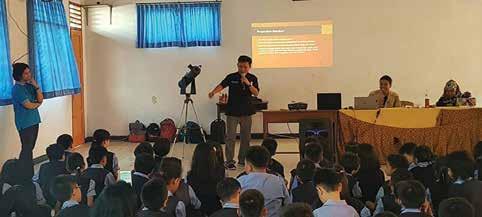
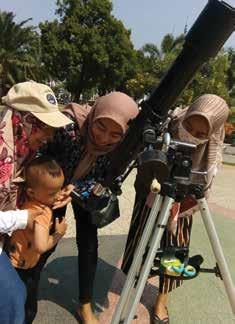
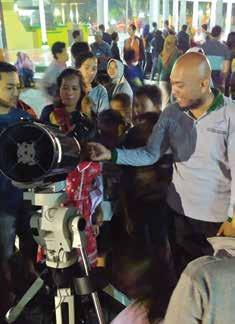
Figure 2. Several ‘safari of the telescope’ programmes carried out by astronomy clubs in East Java: (top) Surabaya Astronomy Club at a local elementary school, (left) Jombang Astronomy Club in the city Madiun, neighboring Jombang, (right) members of FOKALIS JATIM and LAPAN Pasuruan teach at the newly established Arya Wiraraja Astronomy Club. Credit: FOKALIS JATIM.
1. Equalising and expanding opportunities for experiential learning; 2. Developing quality and inclusive education practices. 3. Collaborating with productive and conducive community institutions as centres of learning, education, and culture.
The Importance of Astronomy for Science Popularisation and Social Change
Astronomy is considered unique among sciences (Rosenberg, 2013), and can be a promising avenue for the popularisation of science, community building, and even social unity (Howard, 2009). Through astronomy, we can reach the interest, not only of the amateur astronomer community or students, but to reach all levels of society in the importance of learning throughout life.
Observation is the first and foremost way to introduce science through astronomy because people can directly experience various astronomical phenomena, such as meteor showers, lunar eclipses, solar eclipses, comets among others (Rollinde, 2019; Topper, 2013).
In Indonesia, astronomy is not yet present in primary to secondary education
curriculums. Involving the community directly is a practical action that has been applied to teaching and learning activities for formal education, and has shown to increase interest and improve learning outcomes (Faj, 2018; Yuliana, 2017). After gaining interest in astronomy through an informal learning activity, a person is enticed to further explore the knowledge acquired.
Astronomy communication, which gained momentum during the International Astronomical Union (IAU) centenary, IAU100, has become a potential tool for community building, social unity, and solidarity in various regions (Downer, 2018; Matsumoto, 2018). To this end, we use the ‘safari of the telescope’ approach to share astronomy in East Java (Figure 2).
In principle, the ‘safari of the telescope’ is an astronomical education activity for the public that travels from one city to another. This activity itself covers all cities in East Java, as many as 38 cities. Apart from being public, this activity also includes school visits and was chosen because it represents astronomy as a whole. This activity was originally created by one of the astronomy clubs in East Java, the Surabaya Astronomy Club, in 2014. However, over time, the idea for this activity was adopted by various other amateur astronomy communities in East Java and became a tool to initiate conversations in their respective communities about global citizenship and uniting people from all cultures and backgrounds. Furthermore, this activity aims to inform East Java’s people about climate change by using the perspective of astronomy to remind people that the Earth is our only habitable home. In the ‘safari of the telescope’ series, there are several main activities, such as star parties or astronomical observation sessions in the city center for communities to share knowledge with the public.
We were inspired to work within more communities because there are still imbalances among the amateur astronomy communities throughout East Java, including: an insufficient number of astronomical instruments, uneven distribution of astronomical knowledge, few members, few local meetings for socialisation through astronomy, among other obstacles. These barriers could be minimised through interactions and assistance from other astronomy clubs, which then builds social solidarity across the islands. This is the main point of the ‘safari of the telescope’. Specifically, to get around an insufficient number of astronomical instruments, in addition to borrowing and lending between communities. When the ‘safari of the telescope’ was held, we also raised mutual funds to then buy an astronomical device which in turn will be given to potential communities to be able to use and develop it when the ‘safari of the telescope’ is held in their city.
Through the programme we invite people to observe celestial objects together, gradually provide education, and bring them closer to science, especially astronomy, with fun, interesting and innovative activities. We have repeatedly stated in various visits, that no matter how different we are, at least we are still standing under one sky. With this approach, slowly but surely, people will become aware of the importance of education, tolerance, moderation and unity. Additionally, we believe that the development of this activity will be directly proportional to an increase in people’s creativity and confidence (Hwang, 2014; Davies, 2018). This, in turn, will indirectly control social inequality (Zulfiqar, 2020) and simultaneously improve the socioeconomic level of the East Javanese community (Oldfield, 2009).
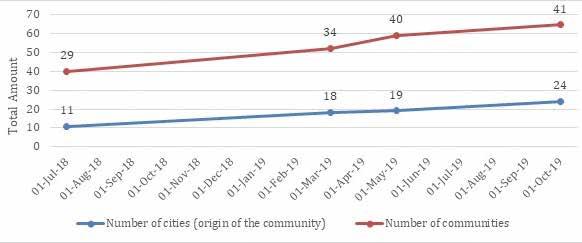
Figure 3. The growth of FOKALIS JATIM membership. Credit: FOKALIS JATIM Developing the East Java Astronomical Communities
East Java Amateur Astronomer Communication Forum (FOKALIS JATIM)
The East Java Amateur Astronomer Communication Forum (FOKALIS JATIM) is a discussion forum and organisation for amateur astronomers in East Java, Indonesia. This forum was formed to support friendships and information sharing among local amateur astronomers and develop the potential of each amateur astronomy community in East Java, based in togetherness, unity and a harmonious vision in the effort to develop astronomy in East Java.
The idea of forming this regional astronomy organisation began at the JANAKA (Indonesian Astronomy Club Jamboree) event, the largest gathering of amateur astronomy communities in Indonesia, on 22-24 September 2017 at the Pasuruan Space and Atmospheric Observatory2 in East Java. The event was attended by 38 communities from across Indonesia. Of the 38 participating communities, 13 came from East Java. East Java also drew the largest number of participants.
FOKALIS JATIM was subsequently founded in 2018, and welcomed 29 amateur astronomy communities. At the end of 2019, we had 41 amateur astronomy communities: 18 based in a city, 11 based at colleges, and 12 based at schools. The growth of FOKALIS JATIM is illustrated in Figure 3.
Actions and Activities
The ‘safari of the telescope’ activity has been integrated into FOKALIS JATIM. The forum
also initiates various other educational activities, such as guest lectures, seminars, webinars and workshops. Sometimes we also coordinate a huge wave of astronomy events throughout the amateur astronomy communities. One example was a Yuri’s Night celebration which gathered almost 300 participants in 28 communities all across East Java in 2019 (Figure 4). In the virtual realm, we also built a virtual data bank called ‘BATAVIA’3, in which we have collected astronomical educational materials from many sources, and amateur astronomers in East Java are free to access them. By using those materials, the amateur astronomy communities could more easily learn and share knowledge with the public and popularise science (Figure 5).
We also have many discussions about astronomy and the practical use of telescope through our official Instagram4 . Through these interactions on social media, we often mediate between amateur astronomers who are not in a community


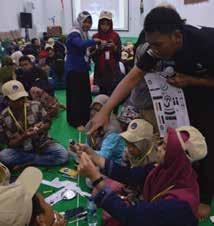
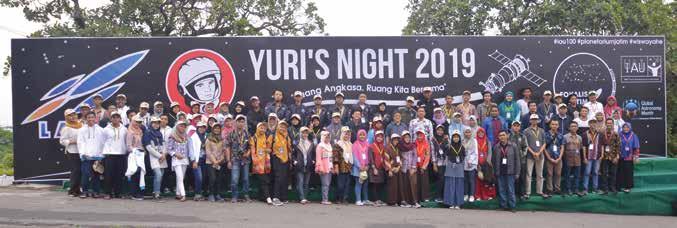
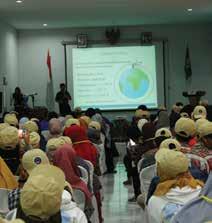
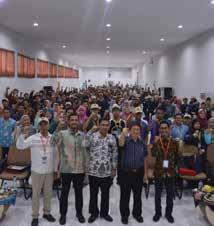
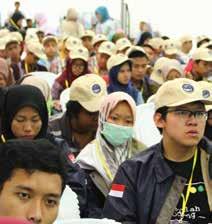
Figure 4. The Yuri’s Night held on 13 April 2019 at Pasuruan Space and Atmospheric Observatory in East Java to commemorate a number of milestones in space exploration, including the 50th anniversary of the Apollo 11 mission and centenary of the International Astronomical Union. Credit: FOKALIS JATIM
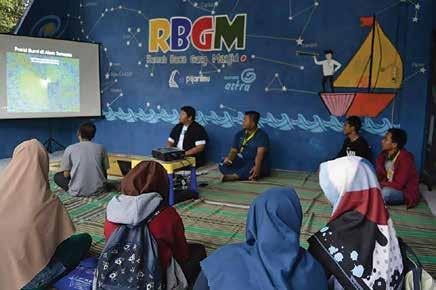
Figure 5. Club members present on an astronomical topic using material on file with FOKALIS JATIM. Credit: FOKALIS JATIM
with the astronomy community closest to them. In addition, our social media has at least three main functions: plan activities for the club members, document the activities of club members, and share general astronomical information.
In line with the concept of unity and solidarity promoted by our forum, we create social opportunities through FOKALIS JATIM. We hold biweekly discussions with representatives of every amateur astronomy community to share their experiences and problems, and we have raised funds to help the recovery of members who had an accident. By doing these things we can easily understand each other and increase solidarity among each member club (Koudenburg, 2013).
Astronomy inherently needs the collaboration of various parties5. Examples of global collaboration through astronomy have existed since the field’s infancy, when early astronomers attempted to perform simultaneous measurements across distant parts of the Earth to measure its circumference. More recently, amateur astronomers in East Java have linked their communities across cities and districts to conduct collaborative astronomical events such as the Pale Blue Dot celebration, World Space Week and International Observe the Moon Night. With regional collaborations such as FOKALIS JATIM, amateur astronomers in East Java now transcend regional borders and all kinds of differences with the goal of exploring astronomy.
Conclusions
It has been shown that there is a great and very realistic potential of the amateur astronomy community in East Java. This is especially true now with the formation of FOKALIS JATIM as a forum that houses all amateur astronomy communities in East Java, and created one of the largest collectives for astronomy outreach in Indonesia. Eventually, the amateur astronomy community can become an essential part of astronomy popularisation, community building, social unity and solidarity in East Java.
Notes
1 Further information can be found at: Information Management and Documentation Office of the East Java Provincial Government, ‘Permasalahan Pembangunan Daerah’[Regional Development Problems], 2014. http://jatimprov.go.id/ppid/uploads/ berkasppid/BAB-2.3-Permasalahan.pdf and OECD, ‘Equity and Quality in Education: Supporting Disadvantaged Students and Schools’, OECD Publishing, 2012. http://dx.doi. org/10.1787/9789264130852-en 2 Balai Pengamatan Antariksa dan Atmosfer LAPAN Pasuruan (Pasuruan Space and Atmospheric Observatory) Instagram: https:// instagram.com/lapanpasuruan/ 3 You can access BATAVIA website here: http://bit.do/BATAVIAFOKALIS, 4 FOKALIS JATIM Instagram: https://www. instagram.com/fokalis.jatim/ 5 International Astronomical Union Office of Astronomy for Development (IAU OAD), ‘Science Diplomacy through Astronomy – Celebrating our Common Humanity’, International Astronomical Union Office of Astronomy for Development. http://www. astro4dev.org/science-diplomacy-throughastronomy-celebrating-our-commonhumanity/more-on-the-flagship-sciencediplomacy-through-astronomy-celebratingour-common-humanity/
References
Davies, D., et. al., ‘Creative learning environments in education—A systematic literature review’, Thinking Skills and Creativity, 8, 2018, p.80-91. Downer, B., Gonzales, J. R., and Canas, L.,
‘IAU100 Celebrations Launched at the IAU
General Assembly in Vienna’, CAPjournal,
No. 24, 2018, p.5-6. Faj, N. A., Fakhri, J., and Yusandika, A. D.,
‘Efektifitas Model Pembelajaran Quantum
Teaching dengan Metode Praktikum terhadap Hasil Belajar Peserta Didik’ [The
Effectiveness of the Quantum Teaching
Learning Model with the Practicum Method on Student Learning Outcomes], Indonesian
Journal of Science and Mathematics
Education, 1, 2, 2018, p.135-141. Herdiansyah, R., ‘Mempertahankan Budaya
Lokal di Era Globalisasi’ [Maintaining Local
Culture in the Globalization Era], 2019. https://www.kompasiana.com/rherdiansyahriko/5ce2dbc4733c43268c7da7f3/ mempertahankan-budaya-lokal-di-era-globalisasi?page=all Howard, G., ‘Legitimating Astronomy’, PhD thesis, School of Social Science, Media and
Communication, University of Wollongong, 2004. http://ro.uow.edu.au/theses/333 Hwang, G. J., Hung, C. M., and Chen, N. S.,
‘Improving learning achievements, motivations and problem-solving skills through a peer assessment-based game development approach’, Educational
Technology Research and Development, 62, 2, 2014, p.129-145. Koudenburg, N., Postmes, T., and Gordijn, E.
H., ‘Conversational Flow Promotes
Solidarity’, PLoS ONE, 8, 11, 2013, e78363, doi:10.1371/journal.pone.0078363
Matsumoto, T., Shinagawa, R., and
Shimabukuro, M., ‘Astronomy as a Possible
Tool of Community Building and Tourist
Resources in the Sub-Tropical Isolated Isles - Case Study in Okinawa, Japan’, CAP 2018
Proceedings, 1, 2018, p.88-89. Muhyidin, A., ‘Pemertahanan Nilai-Nilai
Budaya Lokal dalam Pemelajaran Sastra di
Sekolah’ [Maintaining Local Cultural Values in Learning Literature in Schools],
Development and Language Development
Agency, 2009. http://badanbahasa. kemdikbud.go.id/lamanbahasa/node/306 National Foundation for Education Research (NFER), ‘Exploring young people’s views on science education’, Wellcome Trust, 2011. https://wellcome.ac.uk/sites/default/files/ wtvm052732_0.pdf Nurul, F., ‘Hilangnya Budaya Jawa Karena
Pengaruh Budaya Asing’[The Loss of
Javanese Culture Due to Foreign Cultural
Influences], 2019. https://www.kompasiana. com/ fitriyahnurul/5dbec732097f3677895eab02/ hilangnya-budaya-jawa-karena-pengaruhbudaya-asing?page=all#sectionall Oldfield, S. and Stokke, K., ‘Building unity in diversity: Social movement activism in the
Western Cape Anti-Eviction Campaign,’
Voices of Protest: Social Movements in
Post-Apartheid South Africa, University of
KwaZulu-Natal Press, 2006. Rollinde, E. ‘Learning Science Through
Enacted Astronomy’, International Journal of
Science and Math Education, 17, 2019, p.237–252. doi:10.1007/s10763-017-9865-8 Rosenberg, M., et. al., ‘Why is Astronomy
Important?’, International Astronomical
Union, 2013. https://arxiv.org/pdf/1311.0508 Widianingtyas, H., “Peneliti UGM: Tren
Peminatan Jurusan Kuliah Belum Berubah” [UGM Researcher: The Trend of
Specialization in Lecture Departments Has
Not Changed], Kumparan, 2019. https:// kumparan.com/millennial/peneliti-ugm-trenpeminatan-jurusan-kuliah-belum-berubah1r1aslBsbAy Yamani, A., ‘Menggali Kekayaan Astronomi
Dalam Kearifan Lokal’ [Exploring the Wealth of Astronomy in Local Wisdom], langitselatan, 2008. https://langitselatan. com/2008/06/11/menggali-kekayaanastronomi-dalam-kearifan-lokal/ Yuliana, Y., Hala, Y., and Taiyeb, A. M.,
‘Efektifitas Penggunaan Laboratorium
Terhadap Motivasi dan Hasil Belajar IPA
Peserta Didik SMPN 3 Palakka Kabupaten
Bone’ [The Effectiveness of Laboratory Use on the Motivation and Science Learning
Outcomes of Students at SMPN 3 Palakka,
Bone Regency], Jurnal Nalar Pendidikan, 5, 1, 2017, p.39-45. Zulfiqar, G. and Prasad, A., ‘Challenging social inequality in the Global South: Class, privilege, and consciousness-raising through critical management education’,
Academy of Management Learning &
Education, 2020 (accepted). Topper, D.R., ‘How Einstein Created Relativity out of Physics and Astronomy’, Astrophysics and Space Science Library 394, DOI 10.1007 / 978-1-4614-4782-5, Springer
Science + Business Media, New York, 2013. Desi, S., “Kedokteran Tak Jadi Idola Lagi” [Medicine is not an idol anymore], Radar
Malang, 2019 . https://radarmalang.id/ kedokteran-tak-jadi-idola-lagi/1/2
Acknowledgments
We are indebted to the Pasuruan Space and Atmospheric Observatory, in particular to Mr. Dian Yudha Risdianto for his valuable help with space education.
Moreover, we would like to thank Hammam Nasiruddin, Hairlinda Arini Agustin, Rokhmatul Umaroh, Irvan Maulana Surya Pratama, Nurul Rachmania, Siti Sifa’ Maftuhul Khoir and all the amateur astronomical community delegates who are members of the FOKALIS JATIM network for their great collaboration. These projects have also been made possible thanks to the collaboration of different institutions and astronomical communities in East Java.
Biographies
Muchammad Toyib is an astronomical activist from Surabaya, East Java, Indonesia. He first became interested in astronomy when studying astrophotography, learning about the other side of the sky’s landscape and views. He is very adventurous, currently fighting for the ‘One City One Astronomical Community’ programme and planetarium development in East Java through the East Java Amateur Astronomer Communication Forum (FOKALIS JATIM).
Aditya Abdilah Yusuf is a staff member of ITERA Astronomical Observatory Lampung (IAO) and has a passion for popularising astronomy through public education programmes. He received a bachelor’s degree in astronomy at Bandung Institute of Technology (ITB). Besides professional work at IAO, he is active in several astronomy clubs: Lampung Astronomy Community, Jombang Astronomy Club, and East Java Amateur Astronomer Communication Forum (FOKALIS JATIM).






